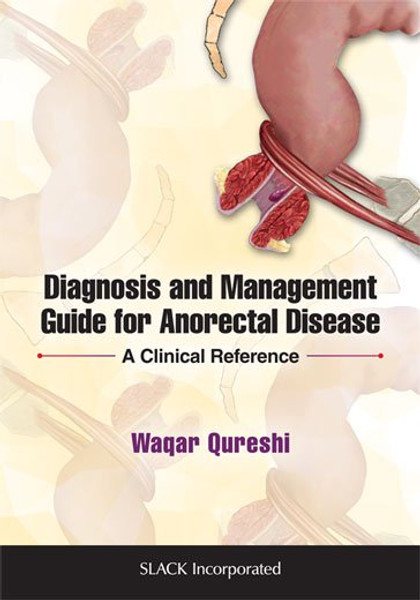Book Description
Many gastroenterologists are presented with patients complaining of one or more of several anorectal symptoms. Patients expect that a gastroenterologist can treat their symptomatic hemorrhoids or anal fissures or diagnose accurately their rectal bleeding. Today the evaluation and treatment of these common ailments is not included within the core curriculum of most gastrointestinal fellowship training programs, and therefore has not been incorporated into a typical GI practice. Diagnosis and Management Guide for Anorectal Disease: A Clinical Reference looks to fill that void.
Dr. Waqar Ahmed Qureshi states that most of these perianal and anorectal problems can be successfully treated non-surgically. Diagnosis and Management Guide for Anorectal Disease: A Clinical Reference reviews a number of diseases that gastroenterologists should be able to effectively manage in their office, which eliminates extra cost, inconvenience, and frustration for their patients.
A few of the topics that can be found inside:
The gastroenterologist occupies a unique position between conservative treatment offered by primary care physicians and the more invasive procedures offered by the surgeon. Diagnosis and Management Guide for Anorectal Disease: A Clinical Reference is designed to provide a comprehensive understanding of anorectal diseases that they can manage and, therefore, improve the care of their patients in one comprehensive volume.
Dr. Waqar Ahmed Qureshi states that most of these perianal and anorectal problems can be successfully treated non-surgically. Diagnosis and Management Guide for Anorectal Disease: A Clinical Reference reviews a number of diseases that gastroenterologists should be able to effectively manage in their office, which eliminates extra cost, inconvenience, and frustration for their patients.
A few of the topics that can be found inside:
- Anatomy and Examination
- Anatomy and Physiology of the Pelvic Floor
- Benign Anorectal Conditions
- Hemorrhoids, Anal Fissures, and Anal Pruritus
- Benign Soft Tissue, Perianal, Perineal, and Complicated Conditions
- Pilonidal Disease, Aanorectal IBD Management, and Defecation Disorders
- Neoplasms
- Anal Carcinoma and screening high-risk groups
The gastroenterologist occupies a unique position between conservative treatment offered by primary care physicians and the more invasive procedures offered by the surgeon. Diagnosis and Management Guide for Anorectal Disease: A Clinical Reference is designed to provide a comprehensive understanding of anorectal diseases that they can manage and, therefore, improve the care of their patients in one comprehensive volume.
More Information
Contents
DedicationAcknowledgments
About the Editor
Contributing Authors
Preface
Section 1 - Anatomy and Examination
Chapter 1: Anatomy and Physiology of the Pelvic Floor
Section 2 - Benign Anorectal Conditions
Chapter 2: Hemorrhoids
Chapter 3: Anal Fissures
Chapter 4: Abscesses and Fistulas of the Anorectum
Chapter 5: Stool Incontinence: Treatment and Outcomes
Chapter 6: Pelvic Floor Disorders and Functional Anorectal Pain
Chapter 7: Anorectal Inflammatory Bowel Disease
Chapter 8: Rectal Prolapse
Chapter 9: Solitary Rectal Ulcer Syndrome
Chapter 10: Chronic Constipation: Assessment and Treatment
Section 3 - Benign Soft Tissue, Perianal, Perineal, and Complicated Conditions
Chapter 11: Pruritus Ani
Chapter 12: Pilonidal Disease
Chapter 13: Trauma and Foreign Body Extraction From the Rectum
Section 4 - Neoplasms
Chapter 14: Anal Carcinoma
Chapter 15: Rectal Cancer
Chapter 16: Miscellaneous Neoplasms: High-Resolution Anoscopy and the Role of Endoscopic Ultrasound
Chapter 17: Anal Cytology, Anal Neoplasia, and High-Resolution Anoscopy in Patients at Risk for Anal Cancer
Financial Disclosures
Index
Reviews
"A welcome, small volume, easy-yet-comprehensive reference on wide range of day-to-day anorectal disease with specific management instructions and algorithms. . . . a valuable addition to any personal or medical library."© Doody’s Review Service, 2020, Sam H. Mardini, MD, MBA, MPH, FASGE (University of Kentucky College of Medicine)
“As the first comprehensive volume covering both conservative treatment and surgical strategies for anorectal diseases, this book would serve well as a desk reference for any trainee or practicing gastroenterology clinician.”
–Justin C. Wheeler, MD, FAAP, Practical Gastroenterology




